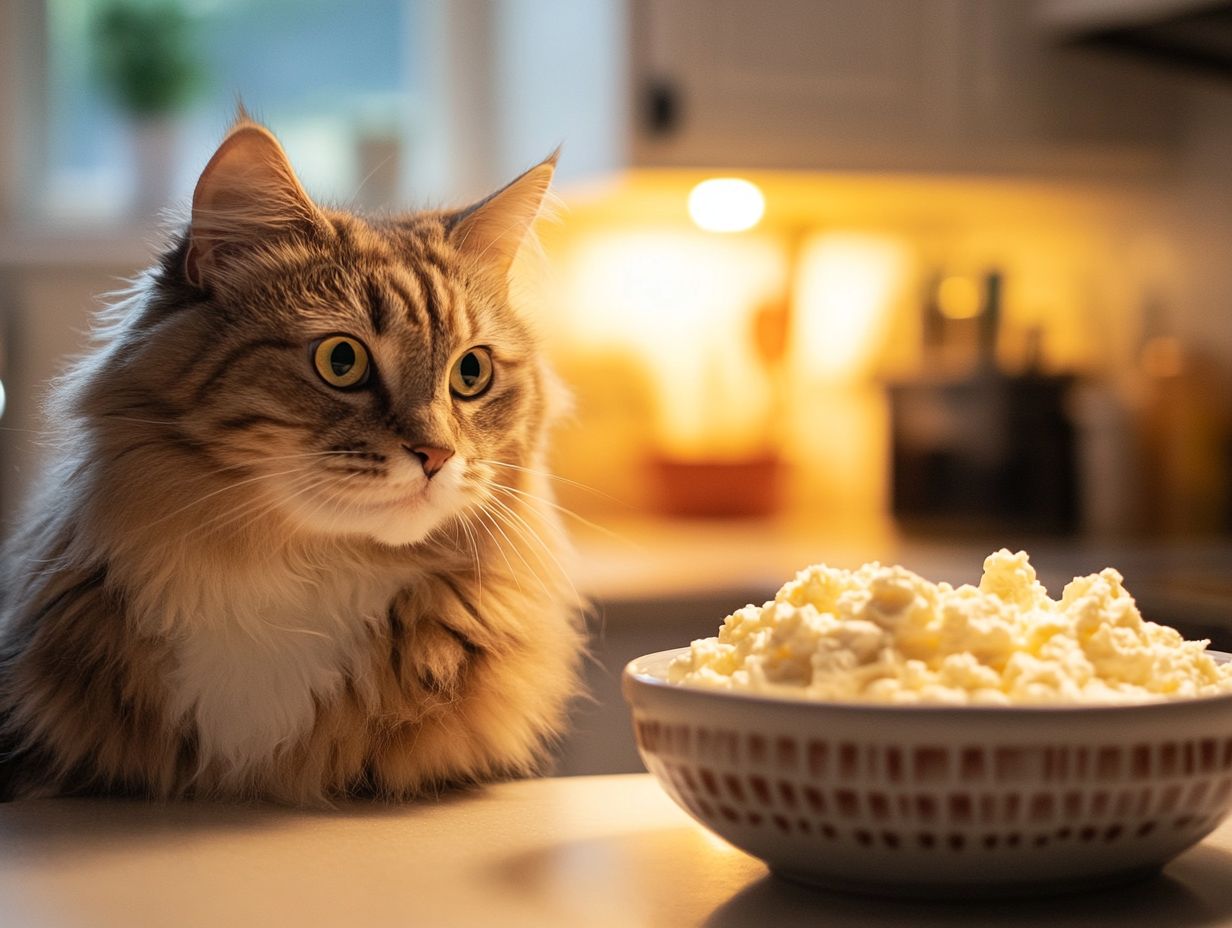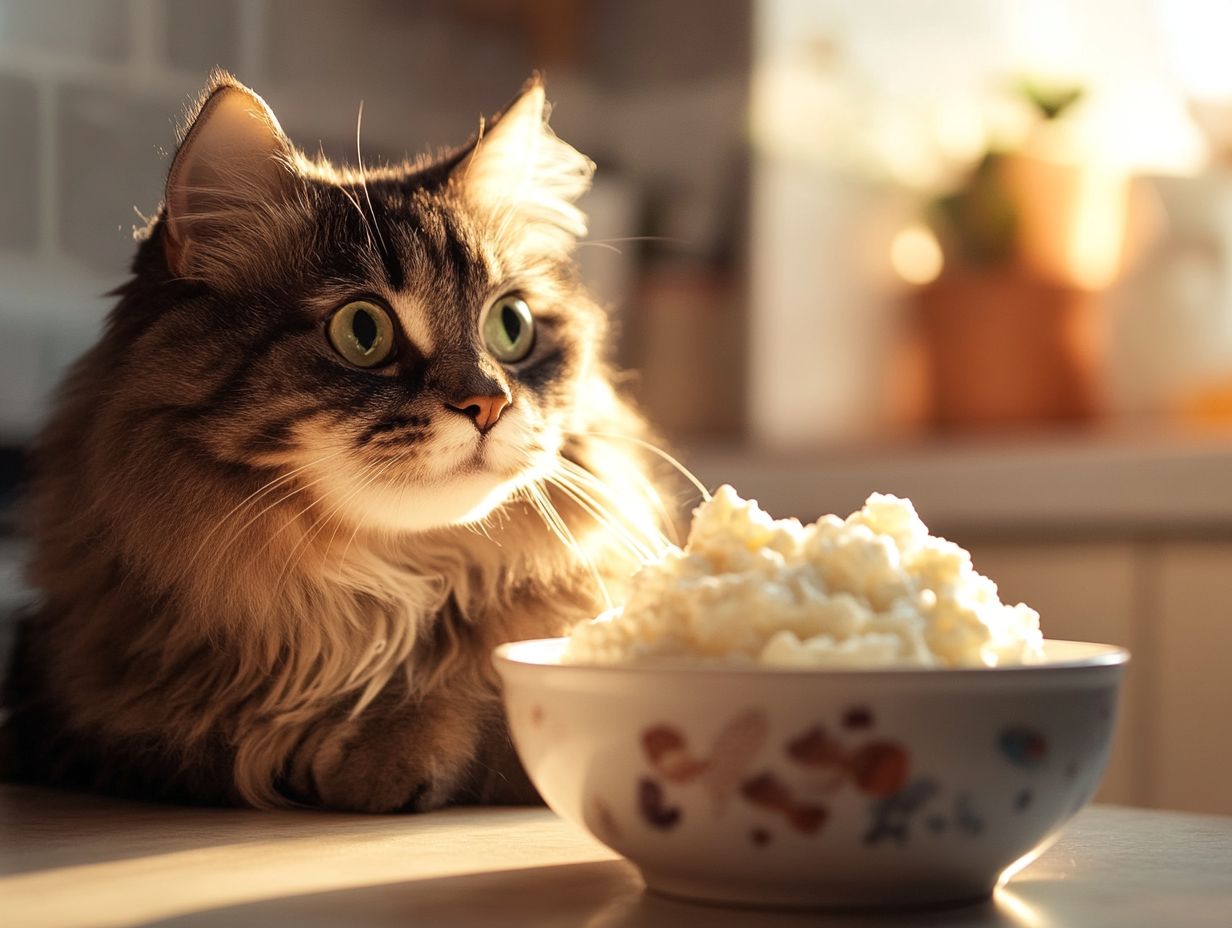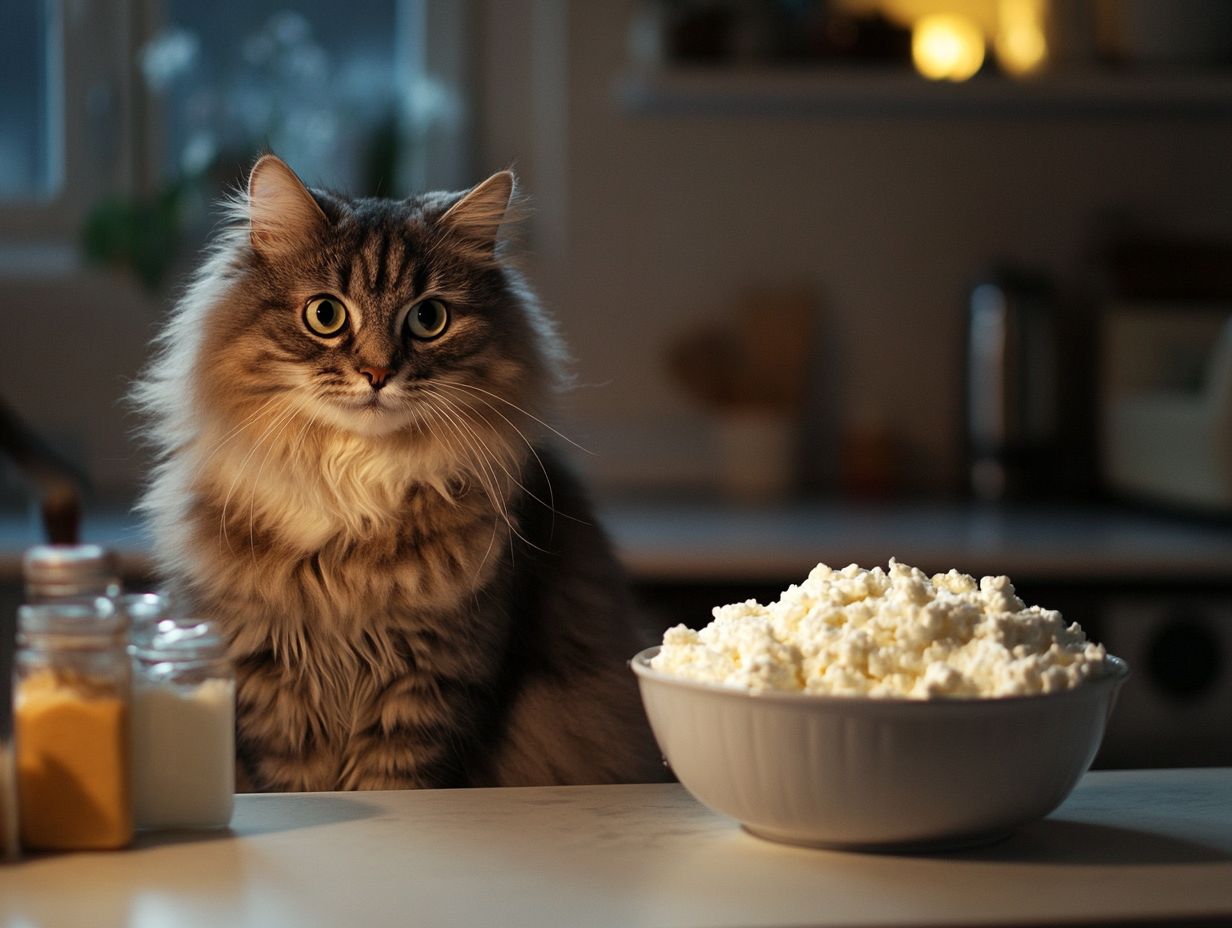Curious about what to feed your feline friend? Understanding a cat’s diet and the impact of various cheese types—such as cheddar cheese—on their health is essential for their health and happiness.
This article explores the nutritional needs of cats, specifically focusing on cottage cheese—its safety, potential benefits, and risks, and how it compares to other cheeses like brie, gouda, and blue cheese. You’ll also find actionable advice, including tips on how to incorporate it into your cat’s diet, suggestions for alternatives, and recommendations for recognizing clinical signs of lactose intolerance.
Whether you’re a seasoned cat owner or a curious newcomer, you’ll find valuable insights to keep your kitty thriving, with a focus on maintaining a healthy diet that includes safe cheese options.
Key Takeaways:
- Cats can safely eat cottage cheese in moderation as a treat, but it should not be a staple in their diet.
- Cottage cheese can provide cats with beneficial nutrients like protein, calcium, and vitamins, but it may also cause digestive issues if fed in excess.
- When incorporating cottage cheese into a cat’s diet, it is crucial to follow recommended serving sizes and consult with a veterinarian to ensure a balanced and healthy diet.
Understanding a Cat’s Diet
Understanding a cat’s diet is essential for pet owners as it helps them recognize what their feline companions need to stay happy and healthy. Cats need a diet primarily made up of meat, which means they require protein from animal sources to maintain their health, along with other crucial nutrients for their digestive systems.
This knowledge also encompasses an awareness of the role of treats, such as cheese, and the importance of following veterinarian-recommended feeding guidelines.
Nutritional Needs and Preferences
Cats have specific nutritional needs that prioritize protein sources to support their energy levels and overall health, making a balanced diet essential for their well-being and longevity. These felines require a combination of essential nutrients, including high-quality proteins, healthy fats, and a variety of vitamins and minerals, to thrive.
Proteins act as the building blocks for tissue repair and immune function, while fats provide necessary energy and promote healthy skin and coat. Vitamins A, D, and B are crucial for vision, bone health, and metabolism.
Many cats may experience digestive issues, such as lactose intolerance, which can lead to uncomfortable symptoms. To address these concerns, veterinarians often recommend tailored dietary practices, including specialized food formulations and the gradual introduction of new ingredients, to ensure a smooth transition while supporting optimal health.
Is Cottage Cheese Safe for Cats?
Cottage cheese can be an appealing treat for cat owners to offer their pets; however, its safety should be carefully considered, as the lactose content may be harmful to lactose-intolerant cats.
Benefits of Cottage Cheese

Cottage cheese can offer potential benefits for cats, such as being a high-protein snack that supports muscle health and providing a significant amount of calcium, which is essential for strong bones and teeth. However, its high calories need to be considered within the context of daily calorie intake.
Risks of Cottage Cheese
However, there are risks associated with feeding cottage cheese to lactose-intolerant cats, as it can lead to digestive issues, including vomiting, diarrhea, or excessive gas. Watch for symptoms like upset stomach, vomiting, or diarrhea after feeding cottage cheese, which are key clinical signs of lactose intolerance. If symptoms occur, discontinue feeding cottage cheese and consult your veterinarian.
Therefore, while cottage cheese may be a healthy treat for some cats, it is crucial to understand each cat’s individual tolerance and prioritize their well-being.
How to Incorporate Cottage Cheese into a Cat’s Diet
Cottage cheese can be offered to a cat as an occasional treat; however, it should be served in appropriate portion sizes and frequencies to ensure a healthy diet.
Recommended Serving Sizes and Frequency
Start with 1 teaspoon for cats under 10 lbs and adjust accordingly for larger cats. It’s essential to observe how your cat reacts and avoid overfeeding.
Conclusion
In summary, cottage cheese can be a healthy addition to your cat’s diet when fed in moderation, but always consult your veterinarian first.
When determining how much cottage cheese to feed a cat, it is recommended to serve one teaspoon for occasional feeding, while larger or more active cats may have up to two teaspoons. It is crucial to ensure that a cat’s total daily calorie intake remains within healthy levels, especially when mixed with commercial-grade food. Overfeeding dairy products can lead to digestive upset, so moderation is critical.
Offering this quantity allows for the benefits of cottage cheese in a cat’s diet without causing undue harm. Since individual cats differ in size and dietary requirements, adjusting the portion to meet each cat’s specific needs is advisable. Feeding cottage cheese once or twice a week as a supplement can provide important nutrients, but it should be balanced with other food sources in the cat’s diet. Being mindful of a cat’s overall intake will promote both moderation and variety.
Guidelines for Safe Feeding
- Offer cottage cheese as an occasional treat; monitor your cat’s reaction and adjust amounts accordingly.
- The recommended frequency is once or twice a week.
- For a cat weighing 10 pounds, a teaspoon of cottage cheese is a suitable treat.
- Consult your veterinarian before introducing cottage cheese or any new food, especially for cats with pre-existing health conditions.
Alternatives to Cottage Cheese for Cats
Cottage cheese can serve as a protein-rich snack for cats; however, pet owners should also consider other alternatives like soft cheese, such as cream cheese, or hard cheese, such as Swiss cheese or cheddar cheese. Each alternative can provide different benefits based on the cat’s unique dietary needs.
Other Human Foods that Cats Can Eat

Plus cottage cheese, cats can safely enjoy other human foods, such as cooked chicken, turkey, and certain fish, all of which are excellent sources of protein. These foods provide the essential amino acids that cats need to maintain strong muscles, along with important vitamins and minerals.
For instance, cooked salmon is rich in omega-3 fatty acids, which promote healthy skin and a shiny coat. A small amount of plain, cooked pumpkin can also offer a good source of fiber, aiding digestion and reducing the occurrence of hairballs. When incorporating these human food options into a cat’s diet, it is vital to ensure they are prepared without added spices, salt, or sauces, as these can be harmful.
When balanced appropriately, these flavorful additions can diversify a cat’s diet while ensuring they receive the nutrients necessary for a healthy, active life.
Final Thoughts and Recommendations
Cottage cheese can be an enjoyable occasional treat for cats; however, it is essential for owners to prioritize their cats’ overall health by following veterinary advice and ensuring a proper, nutritious diet. For more information, check out this article on Can Cats Eat Cottage Cheese? A Guide for Cat Owners.
Each cat’s unique dietary needs vary based on factors such as age, weight, and pre-existing health conditions. These factors should be considered when determining a cottage cheese feeding schedule. A moderate amount of cottage cheese can provide a healthy source of protein and calcium, which supports bone health and muscle development.
However, excessive dairy can lead to digestive upset, making veterinary consultation crucial for personalized recommendations. By focusing on individual needs, owners can create a healthier diet for their cats.
Frequently Asked Questions
Can Cats Eat Cottage Cheese?
Yes, cats can safely eat cottage cheese in moderation.
What are the Benefits of Feeding My Cat Cottage Cheese?

Cottage cheese is a good source of protein and calcium for cats and can also provide some extra moisture in their diet.
Is Cottage Cheese Safe for Cats with Lactose Intolerance?
Cottage cheese is generally low in lactose, so it may be tolerated by cats with lactose intolerance. However, it’s always best to consult with your veterinarian before introducing any new foods to your cat’s diet.
Can Cats Eat Cottage Cheese Every Day?
While cottage cheese can be a healthy addition to your cat’s diet, it should not be fed to them every day. It’s important for cats to have a balanced and varied diet, and too much cottage cheese can lead to digestive upset and nutrient imbalances.
Are There Any Risks to Feeding My Cat Cottage Cheese?
Excessive dairy can lead to digestive upset, so it is essential to monitor your cat’s reaction to cottage cheese and consult your veterinarian for personalized dietary guidance.
Cottage cheese for cats is generally safe when fed in moderation, but it is crucial to ensure that this claim is supported by credible veterinary sources. According to the American Veterinary Medical Association (AVMA), while cottage cheese can be part of a cat’s diet, it should not replace primary nutrition sources. Excessive cottage cheese can lead to digestive issues and may not meet all of a cat’s nutritional needs. Additionally, some cats may be allergic or intolerant to dairy products; thus, monitor your cat for any adverse reactions, as some may occur.
How Should I Feed Cottage Cheese to My Cat?
Cottage cheese should be given to cats as a treat or supplement to their regular diet. It should not replace their regular food. For an average-sized cat, start with a small amount, such as one teaspoon, and gradually increase the portion based on your cat’s size and dietary requirements. Larger cats may tolerate a bit more. Always choose plain, unsalted cottage cheese without any added flavors or sweeteners.
Benefits of Cottage Cheese for Cats
Cottage cheese can provide some benefits for cats, including a source of protein and calcium, which are essential for overall health. However, these benefits should not replace their primary nutrition sources.
Risks of Feeding Cottage Cheese to Cats
While cottage cheese can be a tasty treat, there are potential risks involved. Some cats may be lactose intolerant, which can lead to symptoms such as diarrhea or vomiting. It is essential to be aware of these signs and to discontinue feeding cottage cheese if any adverse reactions occur.
Practical Feeding Tips
For a better feeding experience, consider mixing cottage cheese with wet cat food or offering it as an occasional treat during training sessions. This method can help your cat enjoy the taste while ensuring they receive balanced nutrition.
Conclusion
In summary, cottage cheese can be a safe and enjoyable treat for cats when fed in moderation. Always monitor your cat’s reaction to new foods and consult with a veterinarian if you have any concerns. Remember, moderation is key when introducing any new food into a cat’s diet.